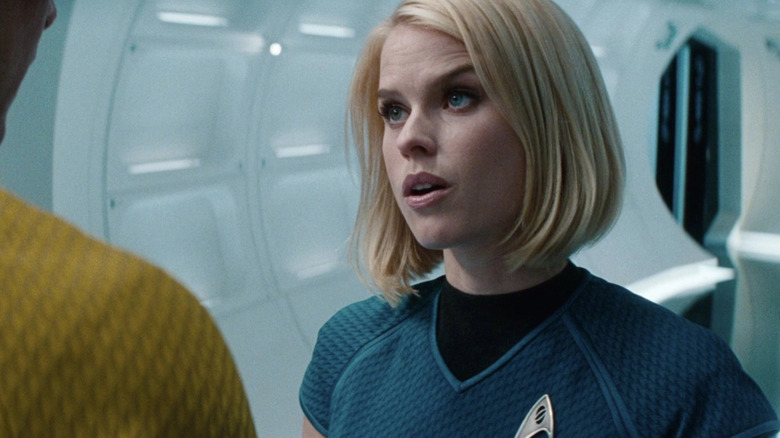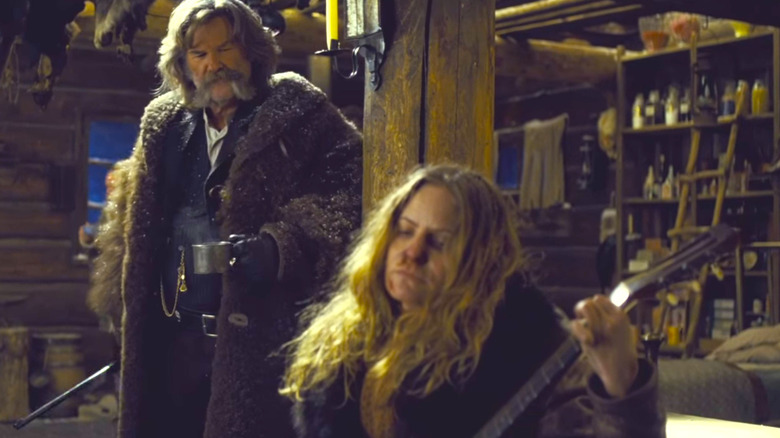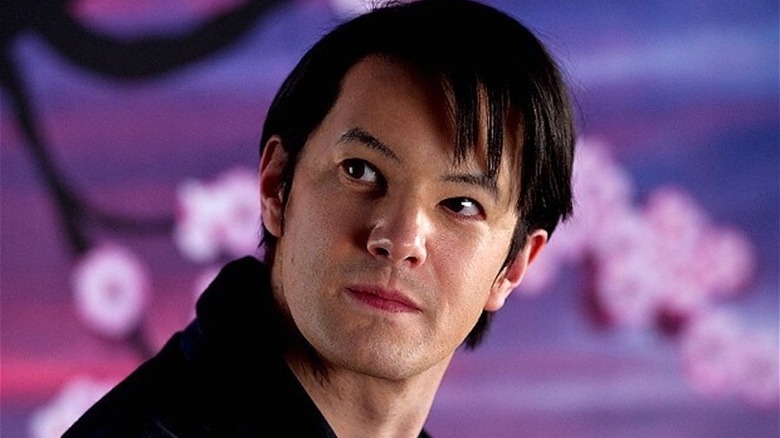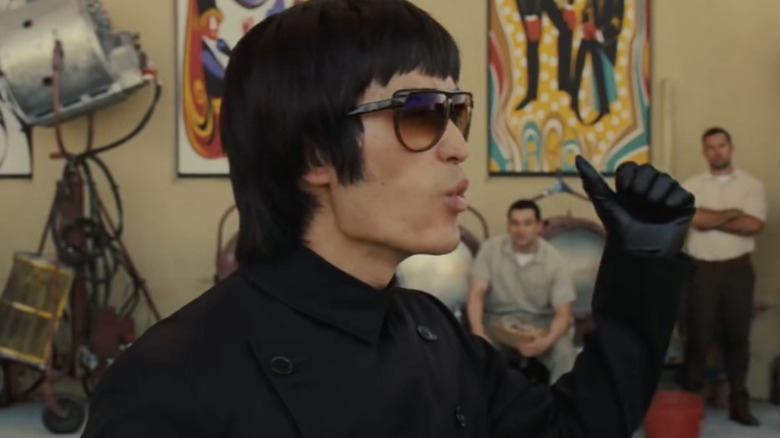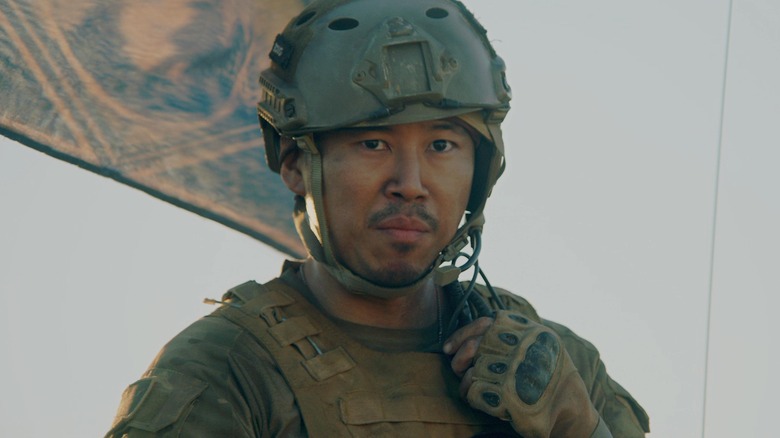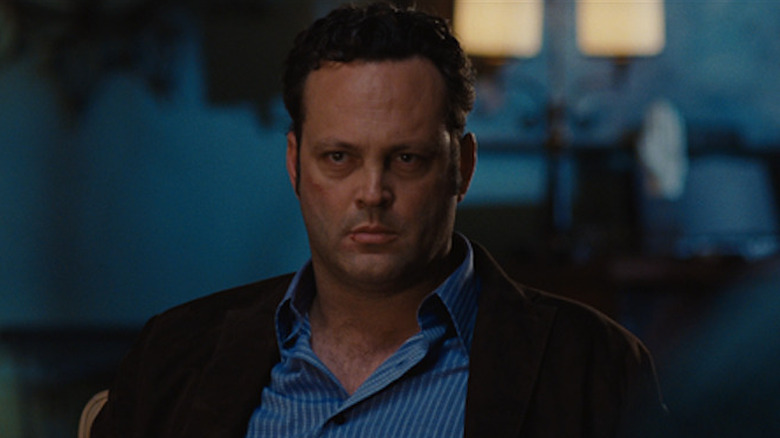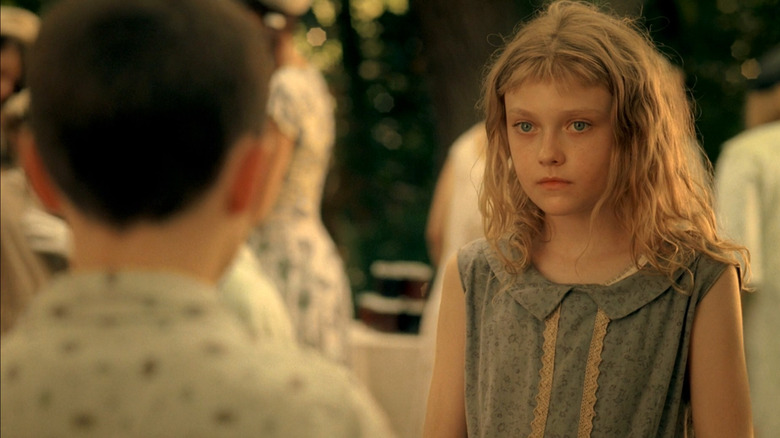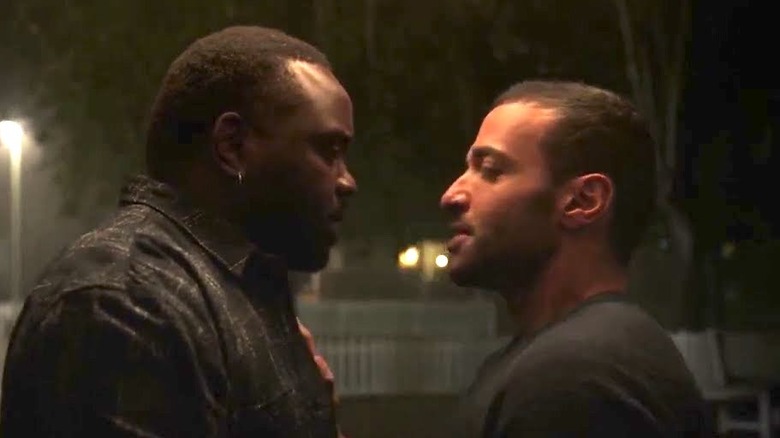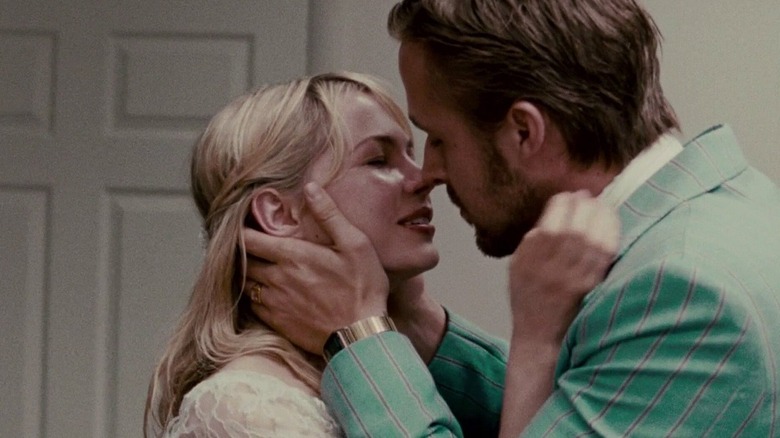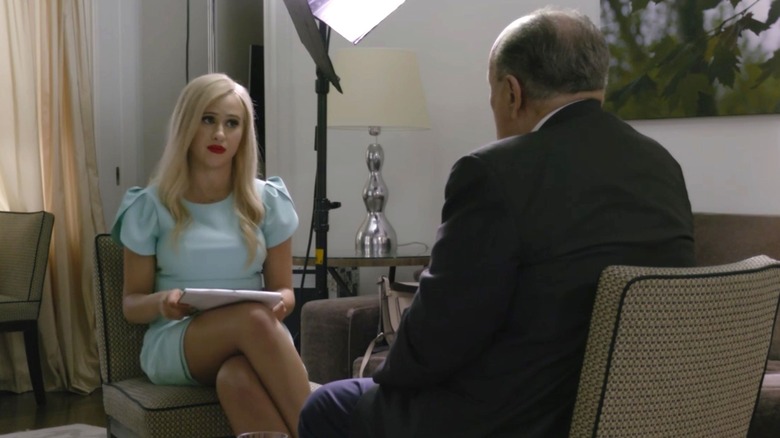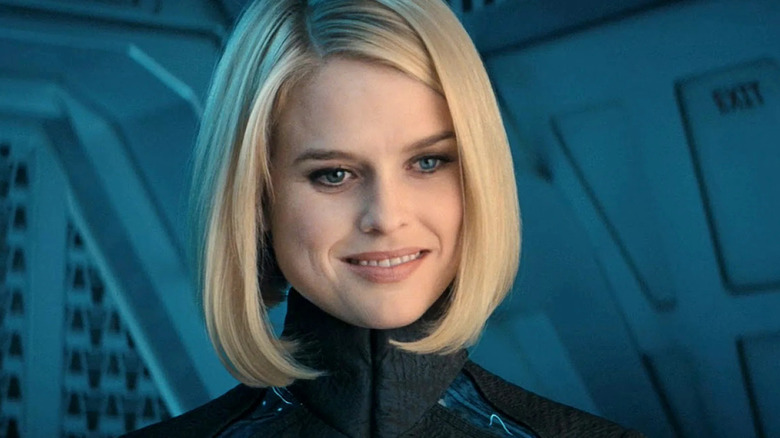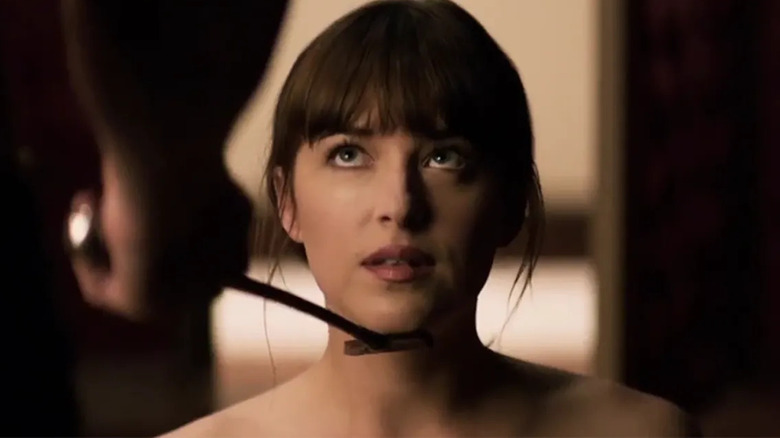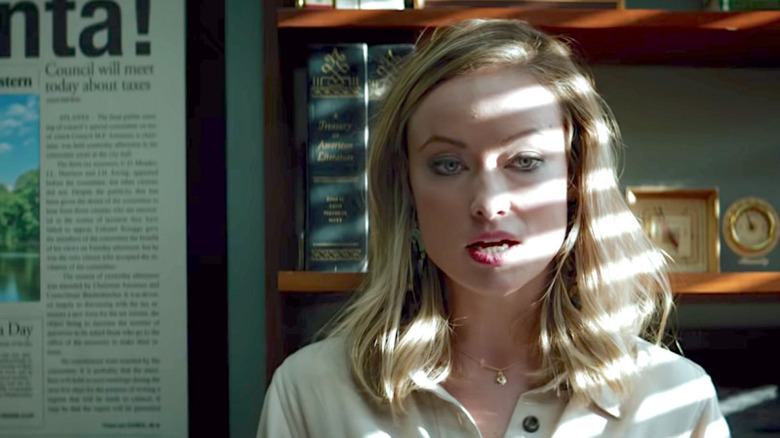Scenes That Put Actors In The Center Of Public Controversy
While many Hollywood actors want to star in a movie that makes headlines, they want it on the front page for its critical acclaim or big box office bucks. Few actors are thrilled, however, when their big, new movie gets attention for being problematic, for a scene that pushes boundaries a little too far, offends an audience, and causes controversy. When that does happen, it can put them in an unfortunate spot — do they defend the artistic integrity of the work, or do they apologize for going too far?
As cultural and societal norms continue to shift, and filmmakers become bolder, this has become more prevalent. Sometimes it's because a film features graphic violence, or flirts with the boundaries of good taste; other times, it's scenes that provoke outrage among more traditional, old-fashioned moviegoers.
Such scandals can often catch the actors involved off-guard; after all, they were merely performing the roles as written for them. How they answer the controversy can be crucial: Will they rise above the fray? Or will the controversy overshadow the film — and perhaps, even their career?
From blockbusters to indie darlings, controversial movie scenes can appear just about anywhere. Below, a few that have put actors front-and-center in a public controversy.
Kurt Russell
For 2015's "The Hateful Eight," Quentin Tarantino cast Kurt Russell in a leading role, playing 19th century bounty hunter John "The Hangman" Ruth; in one truly jaw-dropping moment, Russell became so immersed in the scene that he destroyed a priceless piece of art, causing Hollywood to re-assess its use of valuable props.
The moment comes when Ruth grabs a guitar being played by his bounty, Daisy Domergue (Jennifer Jason Leigh), then smashes it to pieces. Leigh knew she was playing a genuine 1870s guitar (reportedly valued at as much as $400,000), on loan from Pennsylvania's Martin Guitar Museum; Russell did not. If you watch the scene, her horrified reaction is very real.
"We were supposed to go up to that point, cut, and trade guitars and smash the double," production sound mixer Mark Ulano later explained. "Well, somehow that didn't get communicated to Kurt."
"We can't take this lightly," said Martin Museum director Dick Boak. "All this about the guitar being smashed being written into the script and that somebody just didn't tell the actor, this is all new information to us. We didn't know anything about the script or Kurt Russell not being told that it was a priceless, irreplaceable artifact from the Martin Museum." As a result, the museum announced it would cease loaning guitars to move sets "under any circumstances."
Jim Sturgess, Hugo Weaving, James D'Arcy
Since making their mark on Hollywood in the late '90s with "The Matrix," the Wachowskis have struggled to find a hit movie project that can approach its cultural resonance. After their live-action adaptation of the 1966-1968 cartoon "Speed Racer" bombed in theaters, they turned to "Cloud Atlas," a beloved sci-fi novel from author David Mitchell.
A centuries-spanning tale that sees a number of characters being reincarnated across hundreds of years, around the globe and into space as humanity eventually takes to the stars, "Atlas" called for some of its characters to swap ethnicities. This created a very real scandal that would serve as a canary in the coal mine for later projects like "Ghost in the Shell," "Iron Fist," and "Nina," overshadowed by casting decisions that seemed insensitive to race. Rather than casting new actors for its reincarnated storylines, the Wachowskis chose to employ make-up and prosthetics to turn several white actors — including Hugo Weaving, James D'Arcy, and Jim Sturgess — into characters from South Korea.
The movie was almost instantly hit with claims of racism by critics. Accused of using so-called "yellowface" — having Asian characters played by white actors, as employed by Hollywood for decades in everything from "Breakfast at Tiffany's" to the "Charlie Chan" films — the stars of "Atlas" found themselves in the middle of a groundswelling conversation about racial stereotypes in film. The film's condemnation by the Media Action Network for Asian-Americans was just another nail in the film's weak box-office coffin.
"It's an artistically ambitious approach to filmmaking," said the MANAA founder and president. "Unfortunately, it reflects the same old racial pecking order that the entertainment industry has been practicing for years."
Mike Moh
Quentin Tarantino always seems to find himself in the middle of some scandal or another, whether it's for the amount of gratuitous violence in his movies, his pervasive use of offensive language, or destroying a priceless historical artifact. But in the case of his 2019 film "Once Upon A Time in Hollywood," he was accused of rewriting history and offending one of the greatest action heroes in the history of the industry. The film focused on an actor and a stuntman working in Tinseltown in the 1970s, and the tizzy concerned a scene that involved a fictionalized portrayal of iconic martial arts movie man Bruce Lee.
In the scene, Lee (Mike Moh) confronts stuntman Cliff Booth (Brad Pitt), and an altercation ensues that sees the "Enter the Dragon" star tossed aside. Friends, family, and fans of Lee were offended by the portrayal of the Hollywood legend as a loudmouth malcontent and somewhat inept fighter, and caught in the middle of the hubbub was the actor who played him. While Tarantino adamantly stood by the scene, insisting that the real Lee had a disrespect for his stuntmen, Moh was also forced to chime in.
"I'm not going to tell you what the original script had exactly, but when I read it, I was so conflicted because he's my hero," Moh told Birth.Death.Movies, defending the on-screen match-up with Pitt. "After I got slammed, I get serious. And then we get into this scuffle, which is stopped — so, it's a tie."
Jin Au-Yeung
Written and directed by Paul W. S. Anderson, the 2020 movie "Monster Hunter" was based on a popular video game set in a bizarre parallel world where mankind lives alongside gigantic, ravaging monsters.
Anderson once again cast wife Milla Jovovich in the starring role; she plays Artemis, a U.S. Army Ranger pulled into the other world, who must battle the beasts to rescue a team of lost soldiers. A box office bomb, "Monster Hunters" wound up in the headlines for all the wrong reasons, with one scene proving so offensive it was ultimately excised from the film entirely.
In the scene, a character played by Asian-American rapper-turned-actor Jin Au-Yeung cracks a joke that consists of a childish and arguably racist pun, and it garnered immediate backlash. The film was quickly boycotted from cinemas in China, was the subject of widespread derision, and Anderson was forced to issue an apology to audiences. Au-Yeung, too, came out to say he was sorry, but also to explain and justify why he as an Asian-American didn't feel like he'd crossed a line.
"There has been severe controversy due to a line my character says," he posted on his Instagram (per MovieWeb). "The line was intended to be uplifting. I felt a need to address this situation because what is at stake is not my career but something even more dear to my heart — my roots. I've spent the last 20 years using my platform to embrace and be a positive voice for my community. I am and will always be proud of my heritage."
Vince Vaughn
In the 2011 comedy "The Dilemma," Vince Vaughn and Kevin James played Ronny and Nick, a pair of friends who launch an auto design business together.
Just as their latest project has them poised to get rich and famous, Ronny spots Nick's wife (Winona Ryder) cavorting with another man, and worries about how he can break the news without derailing their success. The movie was directed by Ron Howard, who has generally been able to stay out of Hollywood scandals, which is why it was all the more surprising when the movie and its star Vince Vaughn got caught up in a hullabaloo over an offensive moment.
The scene in question has Vaughn's character using the term "gay" as an insult — which angered many, particularly amidst a rash of well-publicized bullying incidents centered on gay teens. While some social rights activists had called for the scene to be cut — and the studio did pull the promotional trailer for the film in the immediate aftermath of the controversy — Vaughn released a statement (via Reuters) in defiance of the criticism.
"Comedy and joking about our differences breaks tension and brings us together," he said. "Drawing divided lines over what we can and cannot joke about does exactly that; it divides us. Most importantly, where does it stop." At the same time, he also expressed support for those "outraged by the bullying and persecution of people for their differences, whatever those differences may be."
Dakota Fanning
A coming-of-age drama from 2007, "Hounddog" was written and directed by Deborah Kampmeier, and starred Dakota Fanning, Piper Laurie, David Morse, and Robin Wright Penn. The film told the story of a little girl in 1950s Alabama, whose abusive home life is buoyed by the music of Elvis Presley.
A somber, dreary drama, there's one scene in particular that raised a ruckus among audiences and critics, when the 12-year old girl is sexually assaulted. More than just a dark, disturbing moment, some lashed out at the filmmakers for exploiting the pre-teen actor playing her, Fanning.
Facing an onslaught of tirades from all sides, Fanning showed poise and professionalism and defended the scene, the movie, and the filmmakers. "It's a movie and it's called acting," the actress said (via the NZ Herald). "What drew me to the film was that my character shows people that you can overcome adversity in life and it doesn't define you." Fanning also felt that the scene could actually be inspirational. "Just because something terrible happened to her doesn't mean she can't have a great life. I wanted to do the film because I thought it might help one person that has happened to and help them overcome adversity in their lives."
In addition, the young actress pushed back against those who blamed the adults around her, including her own family. "When it gets to the point of attacking my mother, my agent ... my teacher, who were all on the set that day, that started to make me mad."
Brian Tyree Henry
Marvel Studios may have had a few controversies behind the scenes, but they've generally tried to stay out of on-screen scandal, never pushing the envelope for audiences too far. But when it came to the 2021 epic "Eternals," there was one scene that sparked an uproar among a certain segment of the audience.
The scene in question occurs when the super-powered, immortal hero Phastos — played by Brian Tyree Henry — is shown to be in a happy marriage with another man, and the two share a kiss.
This created outrage among not just some conservatives, but foreign audiences in particular, as detailed by Out Magazine. Ultimately, some Middle Eastern countries weren't happy with the scene, prompting Marvel and Disney to omit the kiss in some territories. In other countries, the film also removed any allusion to Phastos' relationship, erasing other LGBTQ elements, too. Territories like Saudi Arabia, Kuwait, and Bahrain outright refused to air the film at all due to the mere presence of a gay character, despite Marvel's attempts to cut those portions from the film.
This occurred in spite of director Chloe Zhao's hopes to not censor the picture. "I don't know all the details, but I do believe discussions were had and there's a big desire from Marvel and myself — we talked about this — to not change the cut of the movie."
Michelle Williams
If there's anything that can rile up a mass audience it's a gratuitous sex scene, which can often be downright uncomfortable to sit through, especially in a public setting like a movie theater. As a result, some films have come under fire for salacious scenes that stretch the bounds of discretion — in 2010, "Blue Valentine" courted such controversy.
With a pair of top Hollywood stars – Michelle Williams and Ryan Gosling — the film chronicled a young couple's love, from their initial passionate affair through their tumultuous marriage.
One scene in question, however, got "Valentine" in trouble, and not just because it got the film slapped with an NC-17 label (though the decision was ultimately reversed, and the movie released with an R rating). It involved a sex act, and many weren't happy with the graphic depiction of the intimate moment.
Williams stood firm, insisting there was nothing wrong with the scene, and she wasn't pressured to take part in it in any way. "When we shot that scene, both Ryan and [director] Derek [Cianfrance] said to me, 'If this bothers you when you see it in the movie, we'll take it out,'" she told Reuters. "I thought, 'I've never seen that before in a movie and I'm proud to be the first. Good on us for making that happen.' As the woman in the situation that was in question, I found absolutely nothing scandalous, tawdry or disgusting about it."
Sasha Baron Cohen
If there's any actor who was fully prepared for controversy upon the release of a film, it would have to be Sasha Baron Cohen. A comedian, documentarian, actor, and director, Cohen has long made his living being provocative and prompting public backlash, from his persona as rapper-interviewer on "Da Ali G Show" to his hit mockumentary "Borat." In 2020, he returned as the foreign correspondent in "Borat Subsequent Moviefilm," and not only did it enrage many, but there was one moment that caused a full-blown political scandal.
During the film, Cohen has his on-screen daughter (played by Maria Bakalova) interview politician Rudy Giuliani. In a very real moment — because Giuliani was unaware he was being interviewed for a parody film, believing Bakalova to be a legitimate journalist — the former New York mayor lays back on a bed and reaches into his pants while asking for her phone number. It certainly comes across to the audience like he is propositioning Bakalova, and Cohen's character Borat then bursts into the room to declare that his daughter is only 15 years old.
While Giuliani slammed Cohen and the film for setting him up — insisting he was merely adjusting his clip-on microphone — Cohen doubled down. "I here to defend America's mayor Rudolph Giuliani," he said on Twitter, in character as Borat. "What was an innocent sexy-time encounter between a consenting man and my 15-year-old daughter has been turned into something disgusting by fake news media."
Alice Eve
Though famed for its thought-provoking, often downright cerebral stories, "Star Trek" has been surprisingly filled with sex appeal since its inception in the 1960s. In the original series, it wasn't uncommon to see a scantily clad alien babe locking lips with Captain Kirk or doing a provocative dance. Even into the 2000s, the addition of characters like Seven of Nine and the Vulcan T'Pol on "Enterprise" were obvious attempts to spice up the franchise, yet the movies largely leaned away from such titillation. In 2014, however, a single scene in J.J. Abrams' "Star Trek Into Darkness" drew criticism for its attempt to pander to the male gaze.
Right in the middle of it was actress Alice Eve, who played Kirk's one-time love interest and Starfleet officer Carol Marcus. During a moment on a mission, Marcus must change into a different uniform, and asks Kirk not to watch. Of course he does, and so does the audience, prompting the camera to lock onto Eve's nearly-naked form to allow everyone to gawk. It was a scene viewed by many as awkward and inappropriate at best, grossly misogynistic and exploitative at worst. But Eve herself had no qualms, defending the scene.
"It was something I voluntarily worked with a trainer to be fit for, was very much prepared for, and very much enjoyed — filming, executing, promoting," said the actress in an interview with Inverse. "The feeling I shouldn't have done it, or that it was exploitation, was confusing to me."
Dakota Johnson
Based on a series of best-selling erotic novels, "50 Shades of Grey" was released in 2015 and starred Jamie Dornan as a wealthy and powerful tycoon who becomes a sexual mentor to a young woman, played by Dakota Johnson.
Depicting scenes of BDSM, and what some might consider sexual deviancy, the film predictably made waves for its outrageous content. Pulling few punches, the sex scenes included full frontal nudity and graphic moments of bondage and sado masochism.
But it wasn't just timid moviegoers and religious conservatives who were upset by the film. Even women's rights groups felt its depiction of the male-dominated gender dynamic and the violence portrayed was harmful to young women and girls and promoted domestic violence. For her part in the production, though, Johnson was unapologetic.
"Maybe because I know more about the BDSM world, so it makes sense to me, but everything that these characters do, they make the decision to do it," Johnson said in an on-camera interview (via the Daily Mail). "Christian doesn't abuse Ana. She's not a victim. She's not a sad, weak-minded, passive person. She's strong and confident and is exploring her body and her sexuality in a private environment with somebody that she loves."
Olivia Wilde
Actress Olivia Wilde has found herself in the middle of several controversies over the years, most recently as director on the film "Don't Worry Darling." A few years earlier, it came via a film she starred in: The 2019 biopic "Richard Jewell," from fellow actor-director Clint Eastwood.
"Jewell" recounts the real-life story of the man wrongfully accused of the 1996 Olympic bombing, and how one journalist's misguided zeal led to years of persecution for him. Wilde played journalist Kathy Scruggs — who died in 2011 — and some weren't happy with how she portrayed the reporter on screen.
One scene in particular ruffled feathers, as it showed Scruggs offering to trade sex to an FBI agent in an effort to obtain information on the suspect; no such moment ever actually occurred. Nevertheless, Wilde defended the scene in a red carpet interview with The Hollywood Reporter. "I have an immense amount of respect for Kathy Scruggs," she said while pointing out the double standard between how men and women use sex, in both real life and movies.
"I think people have a hard time accepting sexuality in female characters without allowing it to entirely define that character," Wilde said. "I think that Kathy Scruggs is an incredibly dynamic, nuanced, dogged, intrepid reporter. By no means was I intending to suggest that as a female reporter, she needed to use her sexuality."
